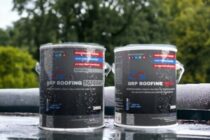Winter Fibreglass Roofing Kits
Our fibreglass roofing kits are specially designed to withstand the challenges of winter weather, ensuring your roofing projects are successful even in cold conditions.
Winter-Ready Roofing Solutions
Prepare Your Roof for Winter
Discover essential tips and products to ensure your roof is ready to face the harsh winter months with confidence and durability.
Prepare for Winter Roofing Challenges
Mastering Fibreglass Roofing in Cold Weather
As the winter season approaches, roofing projects face unique challenges due to the cold weather. However, with the right preparation and materials, you can successfully apply fibreglass roofing even in these conditions. Our fibreglass roofing kits are specifically designed for winter use, providing all the necessary tools and materials to ensure your roofing project is a success, regardless of the temperature.
Our winter-ready fibreglass roofing kits are engineered to perform exceptionally well in cold climates. They include quick-curing resins and durable materials that maintain their integrity even in low temperatures. By choosing our kits, you ensure that your roofing system remains robust and reliable throughout the winter months, protecting your home from harsh weather conditions.
Common Questions About Winter Fibreglass Roofing Kits
Discover the benefits and best practices for using fibreglass roofing kits during the winter months. Our kits are designed to withstand cold temperatures, ensuring a durable and efficient roofing solution.
Can fibreglass roofing kits be used in cold weather?
How should I store resin and topcoat during the winter months?
Are fibreglass roofing kits water-resistant?
Can I apply fibreglass roofing materials during winter precipitation?
How quickly does the resin in the kit cure in cold weather?
What tools are recommended for applying fibreglass roofing materials in winter?
Essential Tips for Winter Roofing
When it comes to winter roofing projects, preparation is key. Ensuring that your materials are stored correctly can make a significant difference in the quality and durability of your finished work. Start by maintaining a stable temperature for your resin and topcoat, as fluctuations can lead to changes in their properties. Additionally, always check the expiration dates on your materials to ensure optimal performance.
Another crucial aspect is the condition of your workspace. Make sure the area is free from snow and ice, and that the surface is clean and dry before beginning your application. This will help in achieving a strong bond and a smooth finish. Investing in quality tools designed for cold weather can also enhance your efficiency and the overall outcome of your project.
Proper storage and handling of your roofing materials during winter months are vital for successful application. Keep your resin and topcoat in a controlled environment to prevent them from freezing, as this can compromise their effectiveness. Before starting your project, allow these materials to warm up to the recommended temperature to ensure they perform as expected.
It’s also important to plan your work around the limited daylight hours typical of winter. Starting early can help you make the most of the available light, ensuring you have enough time to complete each step without rushing. By following these tips, you can achieve a reliable and long-lasting roofing solution, even in challenging winter conditions.
Common Questions About Winter Roofing Kits
Discover the essential information about using fibreglass roofing kits during the winter months. Our FAQs provide insights to help you achieve the best results in cold weather conditions.
How do I store resin and topcoat in winter?
Ensure that resin and topcoat are stored in a temperature-controlled environment. Keep them above freezing to maintain their effectiveness and prevent any changes in their chemical properties.
Can I use fibreglass roofing kits in cold weather?
Yes, our kits are specifically designed for winter use. They include materials that are resilient to cold temperatures and feature quick-curing properties for efficient application.
What precautions should I take during application?
Plan your work around daylight hours and check weather forecasts to avoid adverse conditions. Ensure the roof surface is clean and dry before starting the application process.
Are fibreglass roofing kits water-resistant?
Absolutely. Fibreglass roofing materials provide a durable and water-resistant barrier, making them ideal for protecting against rain, snow, and ice during winter.
What tools are recommended for winter application?
Invest in high-quality brushes and rollers designed for cold-weather use. These tools help ensure a smooth application even in lower temperatures.
Ready to Start Your Winter Roofing Project?
Essential Winter Roofing Practices
Maximise Daylight Usage
Start your roofing projects early to make the most of limited daylight hours during winter.
Monitor Weather Conditions
Check forecasts regularly to avoid working in adverse weather like rain or extreme cold.
Prepare Surfaces Properly
Ensure all surfaces are clean and dry before applying fibreglass materials for optimal adhesion.
Our Winter Fibreglass Roofing Kits provide you with the tools and materials needed to successfully complete roofing projects during the colder months. By following the top tips for storing resin and topcoat and implementing best practices for winter applications, you can achieve durable and reliable results, even in challenging weather conditions.
Stay ahead of the weather and ensure the longevity of your roofing system with our winter-ready fibreglass roofing kits.
Winter Fibreglass Roofing Kits: Q&As
1. Q: Can fibreglass roofing kits be used in cold weather? A: Yes, our fibreglass roofing kits are designed for winter use, featuring materials that are resilient to cold temperatures and formulated for quick curing.
2. Q: How should I store resin and topcoat during the winter months? A: Store resin and topcoat in a controlled environment with a consistent temperature above freezing. Seal containers tightly to prevent moisture ingress and allow the materials to warm up before use.
3. Q: Are fibreglass roofing kits water-resistant? A: Absolutely. Fibreglass is inherently water-resistant, making it an excellent choice for winter applications to create a reliable barrier against rain, snow, and ice.
4. Q: Can I apply fibreglass roofing materials during winter precipitation? A: It’s recommended to avoid applying fibreglass materials during heavy precipitation or extremely low temperatures. Choose days with favourable weather conditions for optimal results.
5. Q: How quickly does the resin in the kit cure in cold weather? A: Our kits include quick-curing catalysts formulated for efficient curing even in colder temperatures. The exact curing time may vary, but it is designed to be faster than standard resins.
6. Q: What tools are recommended for applying fibreglass roofing materials in winter? A: Invest in high-quality brushes, rollers, and other accessories specifically designed for cold-weather use. These tools ensure smooth application even in lower temperatures.
7. Q: Can I use the fibreglass roofing kit for roof repairs in the winter months? A: Yes, the winter-ready fibreglass roofing kit is suitable for roof repairs during colder months. Follow the provided instructions and best practices for successful application.
8. Q: Is there an expiration date for the resin and topcoat in the kit? A: Yes, check the expiration dates on the containers before use. Using materials past their expiration date can affect adhesion and overall performance.
9. Q: Can I start a roofing project early in the morning during winter? A: Yes, planning to start early in the morning allows you to maximize daylight hours during the shorter winter days. This helps in completing each step of the application process efficiently.
10. Q: How do fibreglass roofing kits contribute to preventing leaks during winter? A: Fibreglass roofing materials, being water-resistant and durable, provide an effective barrier against leaks, ensuring the integrity of the roof even in challenging winter conditions.
Q: Can I apply fibreglass roofing materials during winter precipitation?
- It is not recommended to apply fiberglass roofing products during heavy precipitation or extremely low temperatures. The resin in the kit may not cure properly in cold weather, and the materials may become slippery and difficult to work with.
- If you must apply fiberglass roofing during the winter months, choose a day with clear skies and temperatures above freezing. Allow the resin to cure fully before applying the topcoat.
Q: How quickly does the resin in the kit cure in cold weather?
- The curing time for resin in a fiberglass roofing kit can be affected by several factors, including temperature, humidity, and ventilation. In cold weather, the curing time may be significantly longer.
- To speed up the curing process, you can use a curing accelerator. However, it is important to follow the instructions on the accelerator carefully, as using too much can damage the fiberglass mat.
Q: Can I use the winter-ready fiberglass roofing kit for roof repairs in the winter months?
- Yes, the winter-ready fiberglass roofing kit can be used for roof repairs in the winter months. The kit contains special ingredients that help the resin cure properly in cold weather.
- However, it is still important to choose a day with clear skies and temperatures above freezing. Allow the repair to cure fully before exposing it to rain or snow.
Q: Is there an expiration date for the resin and topcoat in the kit?
- Yes, the resin and topcoat in the kit have an expiration date. The expiration date is typically printed on the packaging.
- It is not recommended to use the resin or topcoat after the expiration date, as they may not work properly.
Q: What should I do if I have any questions about using the winter-ready fiberglass roofing kit?
- If you have any questions about using the winter-ready fiberglass roofing kit, please consult the instructions that came with the kit. You can also contact the manufacturer of the kit for additional support.
Here are some additional tips for using Winter Fibreglass Roofing Kits in cold weather:
- Wear warm clothing and gloves to protect yourself from the cold.
- Work in a well-ventilated area to avoid inhaling fumes from the resin.
- Clean the surface of the roof thoroughly before applying the fiberglass mat.
- Apply the resin evenly and avoid trapping air bubbles.
- Allow the resin to cure fully before applying the topcoat.



